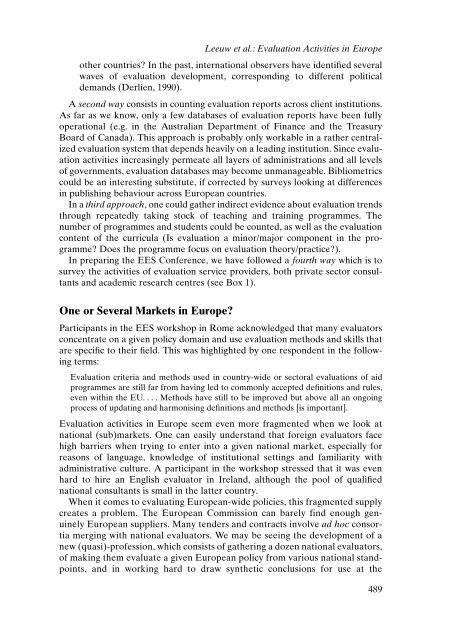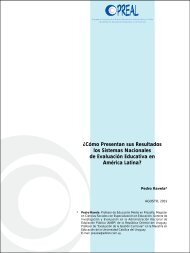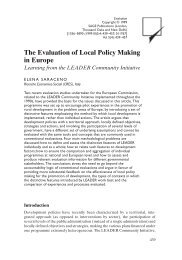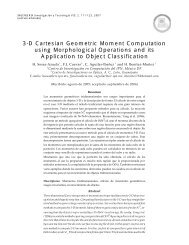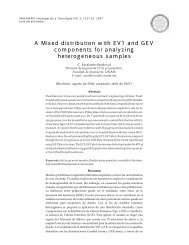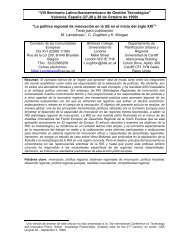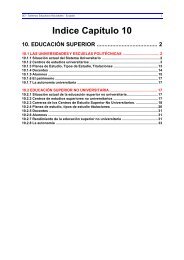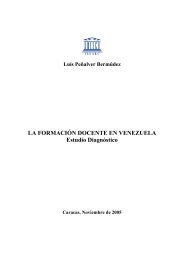Evaluation Activities in Europe: A Quick Scan of the Market in ... - OEI
Evaluation Activities in Europe: A Quick Scan of the Market in ... - OEI
Evaluation Activities in Europe: A Quick Scan of the Market in ... - OEI
You also want an ePaper? Increase the reach of your titles
YUMPU automatically turns print PDFs into web optimized ePapers that Google loves.
o<strong>the</strong>r countries? In <strong>the</strong> past, <strong>in</strong>ternational observers have identified several<br />
waves <strong>of</strong> evaluation development, correspond<strong>in</strong>g to different political<br />
demands (Derlien, 1990).<br />
A second way consists <strong>in</strong> count<strong>in</strong>g evaluation reports across client <strong>in</strong>stitutions.<br />
As far as we know, only a few databases <strong>of</strong> evaluation reports have been fully<br />
operational (e.g. <strong>in</strong> <strong>the</strong> Australian Department <strong>of</strong> F<strong>in</strong>ance and <strong>the</strong> Treasury<br />
Board <strong>of</strong> Canada). This approach is probably only workable <strong>in</strong> a ra<strong>the</strong>r centralized<br />
evaluation system that depends heavily on a lead<strong>in</strong>g <strong>in</strong>stitution. S<strong>in</strong>ce evaluation<br />
activities <strong>in</strong>creas<strong>in</strong>gly permeate all layers <strong>of</strong> adm<strong>in</strong>istrations and all levels<br />
<strong>of</strong> governments, evaluation databases may become unmanageable. Bibliometrics<br />
could be an <strong>in</strong>terest<strong>in</strong>g substitute, if corrected by surveys look<strong>in</strong>g at differences<br />
<strong>in</strong> publish<strong>in</strong>g behaviour across <strong>Europe</strong>an countries.<br />
In a third approach, one could ga<strong>the</strong>r <strong>in</strong>direct evidence about evaluation trends<br />
through repeatedly tak<strong>in</strong>g stock <strong>of</strong> teach<strong>in</strong>g and tra<strong>in</strong><strong>in</strong>g programmes. The<br />
number <strong>of</strong> programmes and students could be counted, as well as <strong>the</strong> evaluation<br />
content <strong>of</strong> <strong>the</strong> curricula (Is evaluation a m<strong>in</strong>or/major component <strong>in</strong> <strong>the</strong> programme?<br />
Does <strong>the</strong> programme focus on evaluation <strong>the</strong>ory/practice?).<br />
In prepar<strong>in</strong>g <strong>the</strong> EES Conference, we have followed a fourth way which is to<br />
survey <strong>the</strong> activities <strong>of</strong> evaluation service providers, both private sector consultants<br />
and academic research centres (see Box 1).<br />
One or Several <strong>Market</strong>s <strong>in</strong> <strong>Europe</strong>?<br />
Leeuw et al.: <strong>Evaluation</strong> <strong>Activities</strong> <strong>in</strong> <strong>Europe</strong><br />
Participants <strong>in</strong> <strong>the</strong> EES workshop <strong>in</strong> Rome acknowledged that many evaluators<br />
concentrate on a given policy doma<strong>in</strong> and use evaluation methods and skills that<br />
are specific to <strong>the</strong>ir field. This was highlighted by one respondent <strong>in</strong> <strong>the</strong> follow<strong>in</strong>g<br />
terms:<br />
<strong>Evaluation</strong> criteria and methods used <strong>in</strong> country-wide or sectoral evaluations <strong>of</strong> aid<br />
programmes are still far from hav<strong>in</strong>g led to commonly accepted def<strong>in</strong>itions and rules,<br />
even with<strong>in</strong> <strong>the</strong> EU.... Methods have still to be improved but above all an ongo<strong>in</strong>g<br />
process <strong>of</strong> updat<strong>in</strong>g and harmonis<strong>in</strong>g def<strong>in</strong>itions and methods [is important].<br />
<strong>Evaluation</strong> activities <strong>in</strong> <strong>Europe</strong> seem even more fragmented when we look at<br />
national (sub)markets. One can easily understand that foreign evaluators face<br />
high barriers when try<strong>in</strong>g to enter <strong>in</strong>to a given national market, especially for<br />
reasons <strong>of</strong> language, knowledge <strong>of</strong> <strong>in</strong>stitutional sett<strong>in</strong>gs and familiarity with<br />
adm<strong>in</strong>istrative culture. A participant <strong>in</strong> <strong>the</strong> workshop stressed that it was even<br />
hard to hire an English evaluator <strong>in</strong> Ireland, although <strong>the</strong> pool <strong>of</strong> qualified<br />
national consultants is small <strong>in</strong> <strong>the</strong> latter country.<br />
When it comes to evaluat<strong>in</strong>g <strong>Europe</strong>an-wide policies, this fragmented supply<br />
creates a problem. The <strong>Europe</strong>an Commission can barely f<strong>in</strong>d enough genu<strong>in</strong>ely<br />
<strong>Europe</strong>an suppliers. Many tenders and contracts <strong>in</strong>volve ad hoc consortia<br />
merg<strong>in</strong>g with national evaluators. We may be see<strong>in</strong>g <strong>the</strong> development <strong>of</strong> a<br />
new (quasi)-pr<strong>of</strong>ession, which consists <strong>of</strong> ga<strong>the</strong>r<strong>in</strong>g a dozen national evaluators,<br />
<strong>of</strong> mak<strong>in</strong>g <strong>the</strong>m evaluate a given <strong>Europe</strong>an policy from various national standpo<strong>in</strong>ts,<br />
and <strong>in</strong> work<strong>in</strong>g hard to draw syn<strong>the</strong>tic conclusions for use at <strong>the</strong><br />
489


